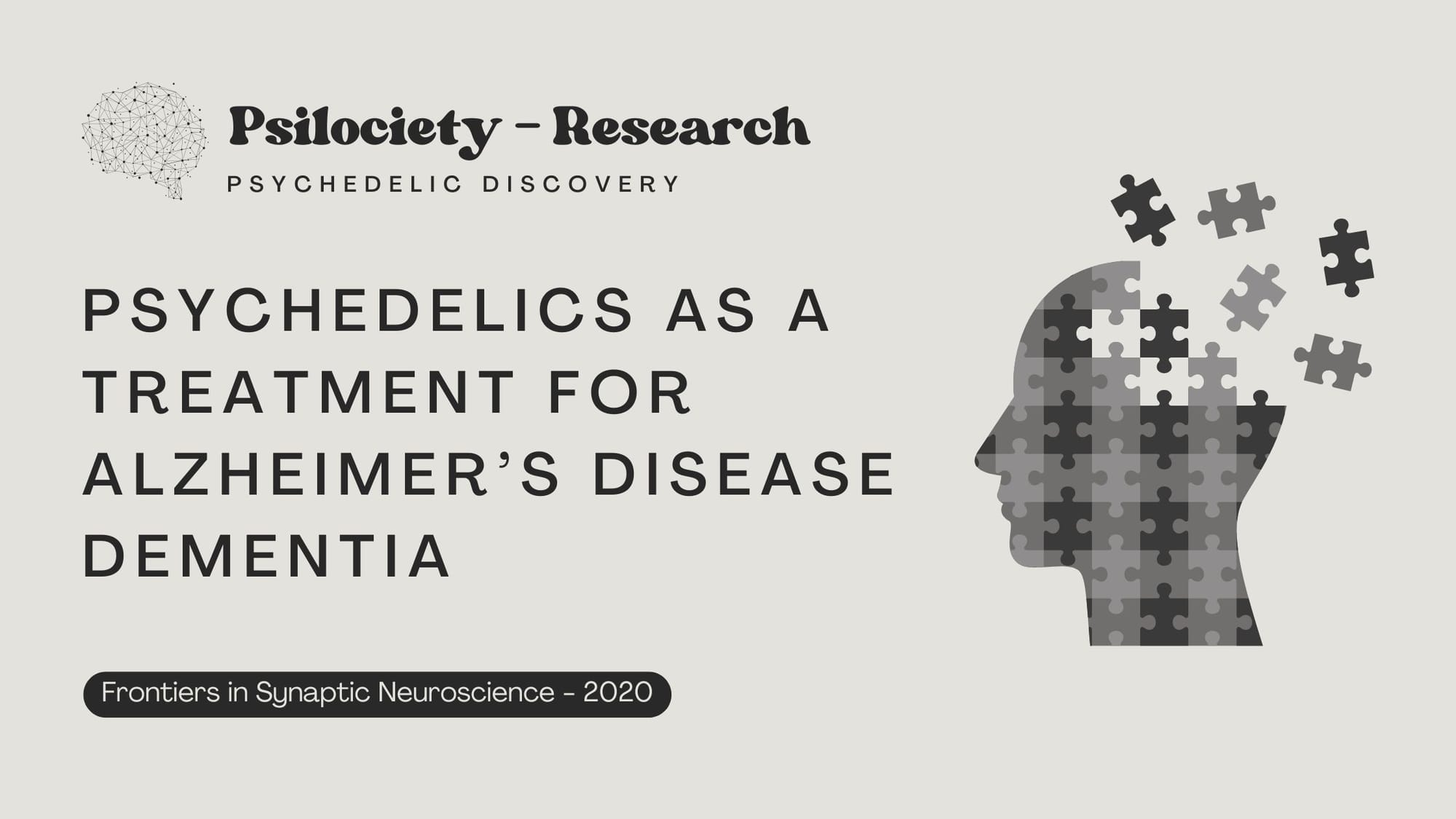Psychedelics as a Treatment for Alzheimer’s Disease Dementia
This study examines the potential of classical psychedelics, such as psilocybin and LSD, to treat Alzheimer’s disease, focusing on mechanisms like neurogenesis, neuroplasticity, and anti-inflammatory effects.

Title & Introduction
- Paper Title: Psychedelics as a Treatment for Alzheimer’s Disease Dementia
- Published In: Frontiers in Synaptic Neuroscience, August 2020
- Authors: Simon Andrew Vann Jones and Allison O’Kelly
- Objective: The study examines the potential of classical psychedelics, such as psilocybin and LSD, to treat Alzheimer’s disease (AD), focusing on mechanisms like neurogenesis, neuroplasticity, and anti-inflammatory effects.
- Importance: Alzheimer’s disease currently lacks disease-modifying treatments. Research on psychedelics suggests they could protect brain structures affected by dementia and offer new therapeutic approaches.
Summary & Takeaways
Key Takeaway: Psychedelics show promise in enhancing brain plasticity and reducing inflammation, offering potential as a treatment for Alzheimer’s disease dementia.
Practical Application: Future clinical trials should investigate both microdosing and full-dose therapies to determine safe and effective protocols for AD patients.
Key Background Information
- Context: AD, a progressive neurological disorder, affects over 50 million people worldwide. It is characterized by amyloid plaques and tau tangles leading to cognitive decline. The hippocampus, critical for learning and memory, is one of the earliest regions impacted.
- Hypothesis: Psychedelics, via their action on serotonin 5HT2A receptors, may stimulate brain plasticity and reduce inflammation, making them promising candidates for AD therapy.
Methodology
- Study Design: Mini-review summarizing existing research on psychedelics and their effects on neurological and psychological functions.
- Participants & Interventions: Reviewed studies include human trials with microdoses (e.g., 5-20 µg LSD) and high doses of psychedelics in diverse populations.
- Duration: Studies reviewed span acute and long-term effects (ranging from hours to months).
Key Findings
Primary Outcomes:
- Neuroplasticity: Psilocybin and LSD promote neuroplasticity in regions like the hippocampus, which is crucial for memory and learning.
- Cognitive Impact: Microdosing studies in healthy adults showed mixed results, with some improvement in psychomotor vigilance but paradoxical effects like reduced concentration at higher microdoses (20 µg LSD).
- Mood and Anxiety: High-dose psilocybin and LSD significantly improved mood and reduced anxiety in patients with life-threatening illnesses, with effects lasting up to 12 months.
Secondary Outcomes:
- Neurogenesis: Animal studies showed that low-dose psychedelics enhance neurogenesis and learning, while high doses may inhibit these effects.
- Anti-inflammatory Effects: Psychedelics activate anti-inflammatory pathways, potentially protecting against oxidative stress and energy metabolism deficits in AD.
Interpretation & Implications
- Conclusion: Psychedelics could serve as a novel approach to modify AD progression through neuroplasticity, reduced inflammation, and improved cognition. However, the optimal dosing strategy remains unclear.
- Implications: Microdosing and therapeutic doses of psychedelics may help prevent or mitigate early AD symptoms. Further studies are required to evaluate long-term effects in cognitively impaired populations.
- Limitations: Lack of large-scale, controlled trials specifically targeting cognitively impaired individuals limits the generalizability of findings.
Researchers & Publication
- Researchers: Simon Andrew Vann Jones and Allison O’Kelly
- Publication Name: Frontiers in Synaptic Neuroscience
- Study URL: https://doi.org/10.3389/fnsyn.2020.00034

